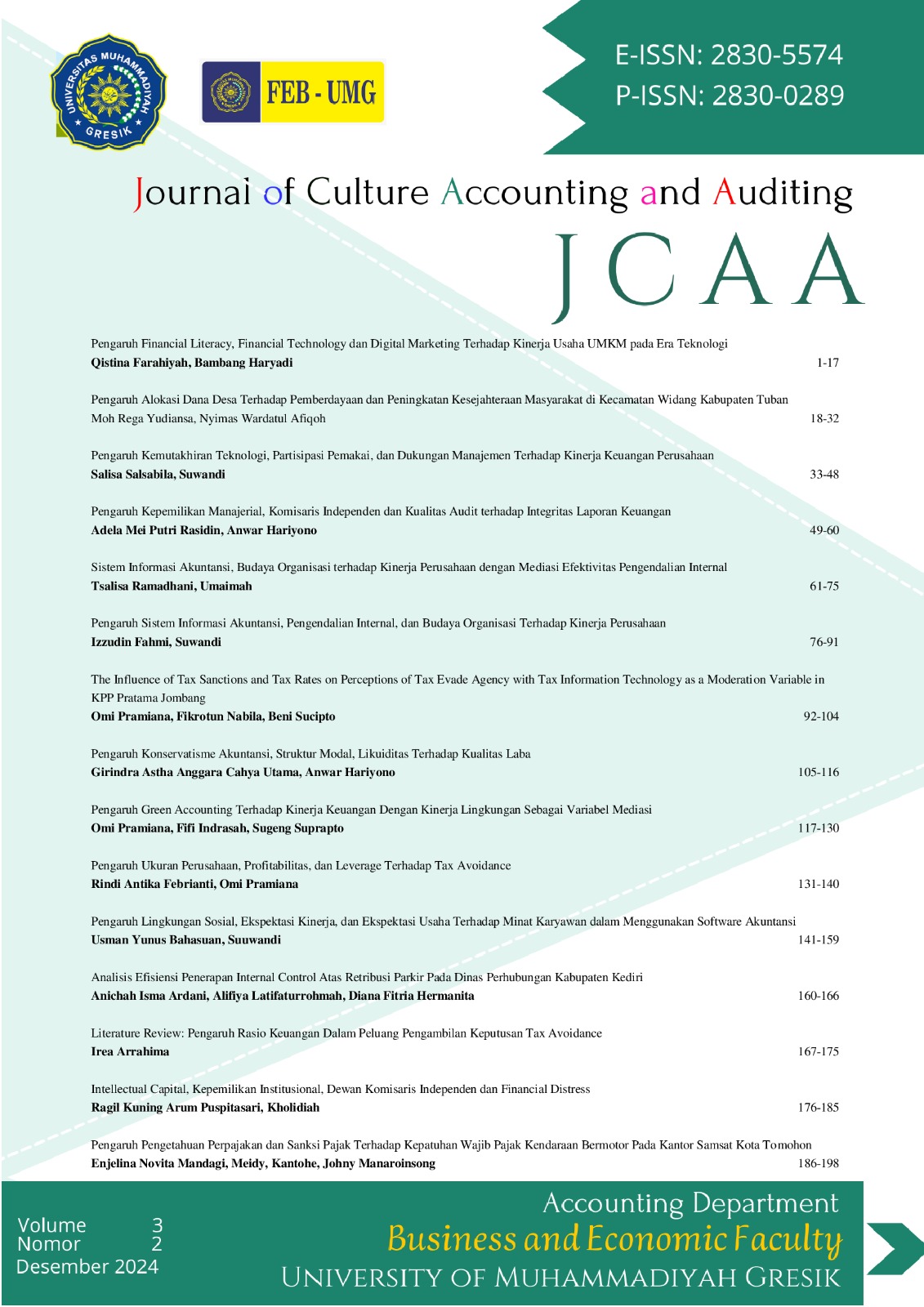The Influence of Tax Sanctions and Tax Rates on Perceptions of Tax Evade Agency with Tax Information Technology as a Moderation Variable in KPP Pratama Jombang
DOI:
https://doi.org/10.30587/jcaa.v3i2.9010Keywords:
Sanksi Pajak, Tarif Pajak, Teknologi Informasi Pajak, dan Persepsi Penggelapan PajakAbstract
Penelitian ini bertujuan untuk mengetahui pengaruh sanksi pajak dan tarif pajak terhadap persepsi penggelapan pajak badan dengan teknologi informasi sebagai variabel moderasi. Populasi yang digunakan dalam penelitian ini adalah seluruh wajib pajak badan yang terdaftar dan telah melakukan kewajiban perpajakannya di KPP Pratama Jombang masa pajak tahun 2022. Metode pemilihan sampel yang digunakan dengan menggunakan rumus Slovin dan diperoleh 100 sampel. Teknik analisis data yang digunakan adalah analisis dengan SmartPLS 4.0. Hasil penelitian ini menunjukkan bahwa sanksi pajak berpengaruh negatif tidak signifikan terhadap persepsi penggelapan pajak badan, tarif pajak berpengaruh positif signifikan terhadap persepsi penggelapan pajak badan, teknologi informasi tidak dapat memoderasi atau memperlemah pengaruh variabel sanksi pajak terhadap variabel persepsi penggelapan pajak badan, dan teknologi informasi dapat memoderasi atau memperkuat pengaruh variabel tarif pajak terhadap variabel persepsi penggelapan pajak badan.
References
Febyani, Y. M., & Widodo, J. (2020). The Role of AEoI in Tax Information Openness to Increase Tax Revenue in Indonesia. Dialogue: Journal of Public Administration Science, 2(2), 147–159. https://doi.org/10.14710/dialogue.v2i2.9921
Felichia, I., & Erawati, T. (2017). The Influence of the Tax System, Tax Sanctions and Tax Rates on Taxpayer Perceptions Regarding the Ethics of Tax Evasion: Case Study in the Special Region of Yogyakarta. BUSINESS STUDY, 25(2), 226–234.
Ghozali, I., & Latan, H. (2015). Partial Least Squares: Concepts, Techniques and Applications Using the SmartPLS 3.0 Program. Diponegoro University Publishing Agency.
Maghfiroh, D., & Fajarwati, D. (2016). Taxpayer Perceptions Regarding the Influence of Justice, Taxation Systems and Tax Sanctions on Tax Evasion (Survey of MSMEs in Bekasi). Journal of Accounting Research, 7(1), 39–55.
Maharani, G. A. A. I., Endiana, I. D. M., & Kumalasari, P. D. (2021). The Influence of Taxpayer Morals, Tax Sanctions, Tax System, Tax Inspection and Tax Rates on Taxpayer Perceptions Regarding the Ethics of Tax Evasion. Collection of Accounting Student Research Results (KHARISMA, 3(1)
Mardiasmo. (2018). 2018 Revised Edition of Taxation. Andi.
Pohan, C. A. (2013). Tax Management Tax and Business Planning Strategy. Gramedia Pustaka Utama.
Pratama, W. B. (2022, October 5). Fuel Transaction Tax Evasion, DJP: State Loss Rp. 24.4 Billion. Bisnis.Com.
Ramli, I., & Arifin, A. Z. (2020). Taxation System, Tax Sanctions, Justice, Discrimination, And Probability Of Cheat Detect Impact On Taxpayer Perception Regarding Tax Evasion Ethics (Study At Primary Kpp In Yogyakarta). Tarumanagara International Conference On The Applications Of Social Sciences And Humanities (Ticash 2019) Atlantis Press, 528–533.
Razif, R., & Rasyidah, A. (2020). The Influence of Self Assessment Systems, Money Ethics, and Taxation Technology and Information on Corporate Taxpayers' Perceptions Regarding Tax Evasion (Case Study at KPP Pratama Langsa). Al Mashaadir: Journal of Sharia Science, 1(1), 1–18.
Official, S. (2017). Taxation Theory and Cases (10th ed.). Salemba Four.
Safitri, T. A. (2022). The Influence of the Tax System, Justice, and Tax Sanctions on Tax Evasion with Information Technology as a Moderating Variable.
Sari, N. P. P., Sudiartana, I. M., & Dicriyani, N. L. G. M. (2021). The Influence of Tax Justice, Taxation System, Tax Rates and Tax Sanctions on Corporate Taxpayers' Perceptions Regarding the Ethics of Tax Evasion (Tax Evasion). 3(1).
Sinambela, E. A., & Putra, A. R. (2021). Self-Assessment System, Tax Technology and Tax Evasion. Journal of Marketing and Business Research (MARK, 1(1), 51–58.
Sugiyono. (2018). Quantitative, Qualitative, and R&D Research Methods. Alphabet.
Utami, P. D., & Helmy, H. (2016). The Influence of Tax Rates, Tax Information Technology, and System Fairness on Tax Evasion: Empirical Study of Taxpayers Who Do Business in Padang City. Accounting Research Vehicle, 4(2), 893–904.
Wardani, D., & Rahayu, P. (2020). The Influence of E-Commerce, Tax Rates on Tax Evasion. Journal of Accounting and Economics, 5(1).
Yetmi, Y. S. (2019). The Influence of Service Quality, Tax Sanctions on Tax Evasion with Tax Information Technology as a Moderating Variable. Journal of Business Economics, 25(1), 80–93.











.png)


